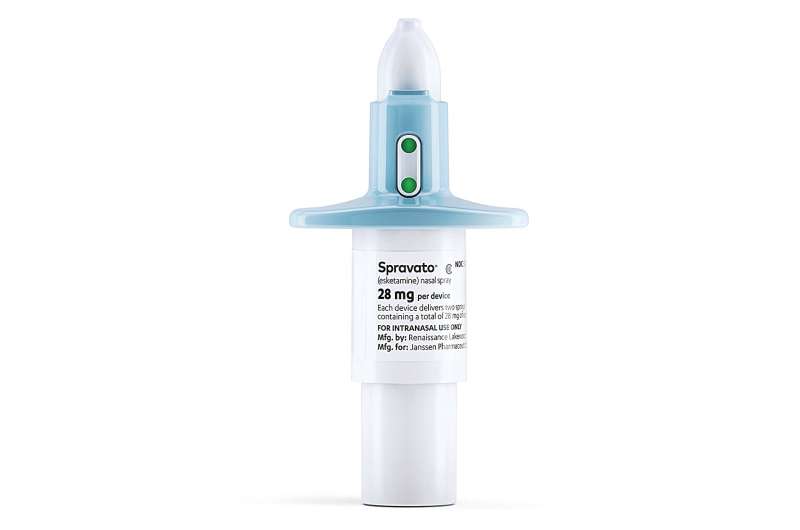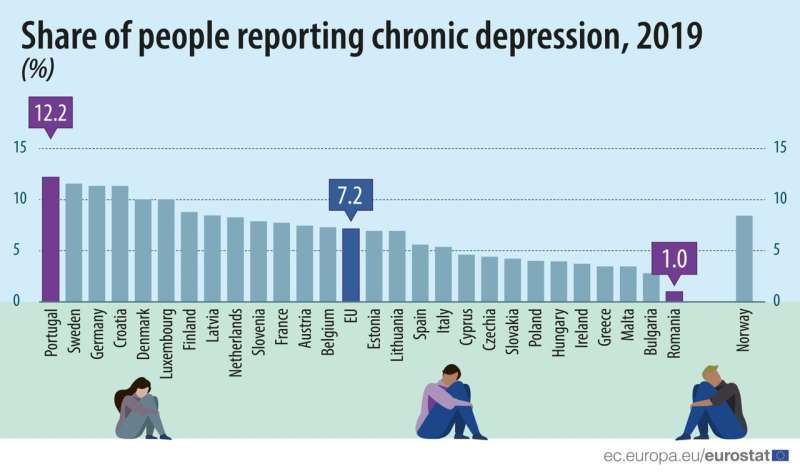This article has been reviewed according to Science X's editorial process and policies. Editors have highlighted the following attributes while ensuring the content's credibility:
fact-checked
peer-reviewed publication
proofread
Esketamine nasal spray: An option for patients with treatment-resistant depression

Treatment-resistant depression (TRD) is a particularly challenging form of major depressive disorder. As Albino Oliveira-Maia, head of the Champalimaud Foundation's Neuropsychiatry Unit and the study's national coordinator for Portugal, explains, "TRD is defined as the persistence of depressive symptoms despite adequate courses of at least two different antidepressant medications." Despite repeated therapeutic attempts, these patients' depressive symptoms remain.
Historically, TRD has posed a significant challenge. A study from the National Institute of Mental Health (NIMH) revealed that while a third of patients with depression found remission with their initial treatment, subsequent treatments saw diminishing returns, with only 10–15% attaining remission by their third trial. This stark reality amplifies the need for more effective intervention strategies.
Esketamine: Finding a treatment for TRD
Janssen developed esketamine nasal spray, a formulation which has shown superior efficacy compared to placebo in several clinical trials. It has also secured approvals from the US Food and Drug Administration (FDA), in the US, and the European Medicines Agency (EMA), in Europe. But why is there a need for another drug in the already crowded antidepressant market, and another study on esketamine NS?
As Oliveira-Maia puts it, "While there are many treatments available for depression, there is a paucity of drug options tailored for TRD. Moreover, in order to guide clinicians and patients in their decision-making, and to be adopted by health insurance companies and governments, drug manufacturers need to demonstrate a distinct advantage over existing treatment modalities, underscoring the rationale for this study."

Head-to-head: Esketamine versus Quetiapine
The study compared esketamine NS with oral quetiapine XR, an atypical antipsychotic originally authorized for conditions like schizophrenia but increasingly used, with regulatory approval , as an adjunctive treatment for difficult-to-treat episodes of depression. Oliveira-Maia notes, "Quetiapine is currently one of the few alternative medications approved as an add-on for patients with a major depressive episode and inadequate response to ongoing antidepressant treatment."
Designed to mimic real-world conditions, the study was open-label, meaning both health care providers and patients were aware of the medications being used. Furthermore, given esketamine NS's potential for acute dissociative effects, a double-blind approach was impractical. Importantly, however, efficacy assessments were conducted on site by independent raters who were blind to the trial group allocations.
The multi-center international study screened over 800 patients, of whom over 600 met the strict eligibility criteria for TRD and were subsequently included in the study.
Study participants were split into two cohorts: one self-administered quetiapine XR at home, while the other received esketamine NS under hospital supervision. Concurrently, both groups continued their most recent antidepressant regimen with a conventional antidepressant, either a selective serotonin reuptake inhibitor (SSRI, for example fluoxetine) or a serotonin and norepinephrine reuptake inhibitor (SNRI, for example venlafaxine).
"The study spanned 32 weeks, which is longer than typical trials," says Oliveira-Maia. "This allowed us to gauge both short-term and long-term treatment outcomes. Throughout this time, we closely monitored participants' responses, side effects, and the medications' overall efficacy."
Oliveira-Maia elaborates, "We aimed to ascertain whether patients on esketamine NS were more likely to achieve remission— essentially corresponding to elimination of symptoms—by the eight-week mark, compared to those on quetiapine XR. Among those who achieved this remission at two months, we sought to determine the effects of continued treatment on preventing relapse in both arms up to the trial's conclusion at 32 weeks."
Unveiling the findings
The results? After 8 weeks, both groups surpassed the 10–15% remission rate noted in the NIMH study, as published in the New England Journal of Medicine.
Notably, 27.1% of patients on esketamine NS achieved remission, compared to 17.6% on quetiapine XR, with both groups continuing treatment with a conventional antidepressant (either an SSRI or SNRI). Long-term data was even more informative. The proportion of patients who achieved remission at week 8 and sustained it without relapse through week 32 was 21.7% for the esketamine NS group and 14.1% for the quetiapine XR group.
Most noteworthy for the authors was the marked uptick in remission rates after the initial eight-week initial period. As Oliveira-Maia remarked, "Had this trial concluded at eight weeks, the results would be quite interesting but not remarkable. However, the 32-week data tells a different story." By this juncture, around half of the patients persisting with esketamine NS treatment—encompassing those not in remission by week eight—had achieved remission. In contrast, only a third of those continuing with quetiapine XR reached this state.
In addition to therapeutic efficacy, safety parameters were critically assessed. Both treatment options recorded very low rates of severe adverse events such as mortality or suicidal ideation. However, when examining less serious side effects, patients in the esketamine NS group presented a higher frequency compared to those in the quetiapine XR group.
"This was anticipated, given esketamine's dissociative properties," says Oliveira-Maia. "Interestingly, the rate of patients discontinuing treatment due to side effects was actually lower for esketamine NS than for quetiapine XR, which suggests that while esketamine NS may have more side effects on paper, those caused by quetiapine were less tolerable."
The road ahead: Clinical and policy implications
The findings are promising for patients grappling with TRD. Yet, as Oliveira-Maia points out, "The real challenge is shifting from research to policy. The impact of esketamine NS can only be realized if patients can readily access it." At present, in Portugal and many other countries, there is limited access to approved, evidence-based treatments for TRD, including esketamine, but also electroconvulsive therapy and transcranial magnetic stimulation (TMS). "Continued research and strong advocacy are needed to make sure treatments reach the patients who need them."
Looking forward, Oliveira-Maia remains optimistic. "Our future research endeavors aim to pinpoint predictive markers for treatment responsiveness. Additionally, we want to investigate ways to improve and sustain remission rates, including the potential role of psychotherapy. TMS is also high on our list for future exploration."
"However, scientific progress must be matched with proactive policy measures and concrete governmental action. Ultimately, our goal is to construct a health care landscape where patients are not relegated to subpar, non-evidence-based treatments due to lack of access to more effective options."
More information: Albino Oliveira-Maia et al, Esketamine Nasal Spray versus Quetiapine for Treatment Resistant Depression, New England Journal of Medicine (2023). DOI: 10.1056/NEJMoa2304145 , doi.org/10.1056/NEJMoa2304145
Rupert McShane, Loosening the Shackles of Depression, New England Journal of Medicine (2023). DOI: 10.1056/NEJMe2309758 , www.nejm.org/doi/10.1056/NEJMe2309758


















